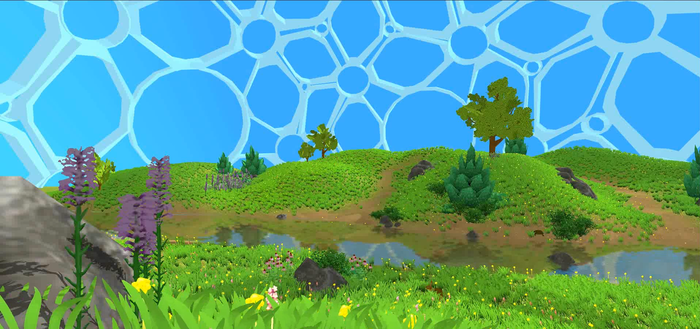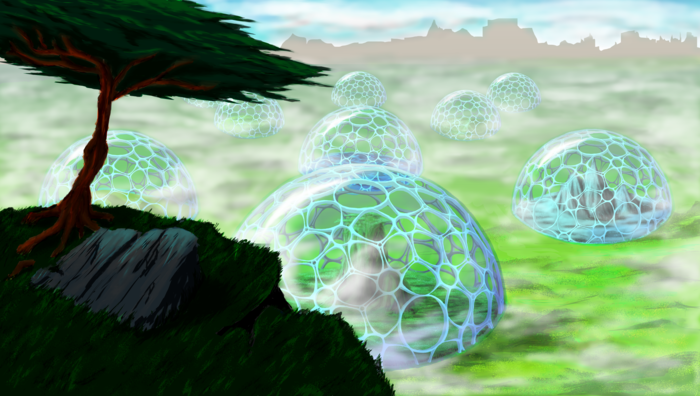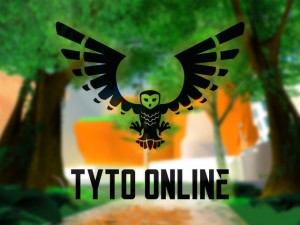 If you’ve been on Cliqist lately then you’re probably already aware of Tyto Online. If not, you can take a look at our previous articles about the impressive MMO project. Curious to learn even more about Tyto Online, we were lucky enough to secure an interview with Immersed Games’ CEO Lindsey Troupf. She provided some wonderfully lengthy responses to our questions, so you might want to get a drink and some snacks before settling in to read!
If you’ve been on Cliqist lately then you’re probably already aware of Tyto Online. If not, you can take a look at our previous articles about the impressive MMO project. Curious to learn even more about Tyto Online, we were lucky enough to secure an interview with Immersed Games’ CEO Lindsey Troupf. She provided some wonderfully lengthy responses to our questions, so you might want to get a drink and some snacks before settling in to read!
Cliqist: Where did the inspiration for Tyto Online come from? How long have you had this game idea brewing in your mind and what stopped you from creating it at that point?
Lindsey Tropf: The inspiration for Tyto Online came from playing a lot of World of Warcraft and realizing one day that I had learned so much: thousands of items, abilities, and strategies, all without trying. I realized then what a powerful learning tool games were, but hadn’t yet started reading and learning about the area. That was when I was an undergraduate, probably 2006-2007. I ended up going into education, and kept considering this idea.
When I entered graduate school for my PhD in 2008, one of my potential research interests was educational games. But as I continued learning about education theory and realizing how perfect an MMORPG would be for learning, I also realized that I wasn’t seeing games out there that truly took advantage of the power of the medium. Having had some experience with small business by this point, in about 2010, I decided this was definitely something I wanted to do. Of course, I’m a PhD candidate in education, so I can’t build something like this on my own. Definitely not my skill set!
So I have spent years finishing up my PhD program, thinking about it, studying what it takes to do a startup, etc. while slowly finding my team members — my husband Ryan for customer and employee management/engagement, Paul for art (July 2012), Caroline for writing (October 2013), and Sam for programming (January 2014).
It took all those pieces before things finally started moving quickly!
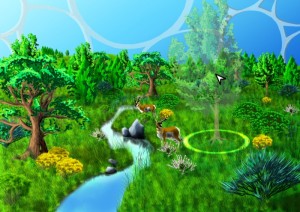 Cliqist: How did Immersed Games get started? What are its founding principles and what is the culture of this studio like? Do you believe it [the culture] to be different from that of other “indie” developers?
Cliqist: How did Immersed Games get started? What are its founding principles and what is the culture of this studio like? Do you believe it [the culture] to be different from that of other “indie” developers?
Lindsey: It’s been a soft starting date — first Paul moved across the country and in with Ryan and I and we started brainstorming and working on art assets, then we found our writer, Caroline, and just had to recruit programming interns without a tech cofounder — and one of them became our tech cofounder. So it has been a long time building up everything and recruiting the right people. Now that we have a complete team, we’re really full blast working on this and it’s just an incredible feeling seeing the progress every single week.
In terms of our principles and the culture… we all really, really believe that this needs to be made. Our mission is to harness the addictive power of video games for learning, and our team members get very excited to discuss new applications, talk to people, and spread the word. How excited people get about what we are doing in particular helps determine how much I want to bring them onto my team!
Being a new studio, we are still building our culture, but it is important to us, so we’ve had conversations between co-founders early on about what we want our values to be. The primary ones we have set out right now are: no pretense (please just be direct), love to learn (because if you work with us, you’ll be learning constantly as we build educational content), give back (helping others, causing good in the world), enjoy yourself (you should love doing this), challenge anything (seriously, we don’t want Groupthink), and be bold (we do have audacious goals, after all).
We certainly have a lot of diversity of backgrounds and approaches, and are very inclusive, which I think makes for a really rich environment. For example, a third of our current team are women, and we have people with backgrounds from traditional programming and art to concept artists with backgrounds in biological science and chemical engineering.
Because I’ve never worked in another indie studio, I talked to some team members who have to get a sense of our differences from places they have experienced (note: this is not different from all indie studios, just from their previous experiences). We have a hierarchy and know who is in charge of things, but it isn’t unilateral; everyone has great ideas and worthwhile perspectives, and we are completely open to an intern having a better idea than the CEO or any of our leadership. We also don’t support crunch as the norm, although it has happened and we recognize that. When it has happened, we viewed it as a failing on the part of leadership, not the team. We did not help our team set an appropriate scope and maintain reasonable goals over the course of the months they were working on the project, and have made adjustments to how we manage tasks since then to minimize it in the future.
At the core, I think all indie studios are working on something they really believe needs to be made, and doing their best with limited resources to make that happen as well and quickly as possible! So we’re really doing that, but also with a social mission.
Immersed Games is made from a team of diverse visionaries that share a social mission and dream to use games to improve the world.
Due to the fact that most of our team right now is part time and interns, we meet as a large group once a week with a meal (generally one I’ve cooked), sharing what we worked on the previous week, asking for any help or cross-over between functional teams, and then split up to collaborate in our functional teams and assign work for the next week. We use Trello with a scrum approach, lists of tasks that people get for each week’s sprint, that are then submitted as done, reviewed and moved to approved when ready, and shared at that next week’s meeting. It’s worked out very well to organize a pretty large group of people — our team is over 20 right now.
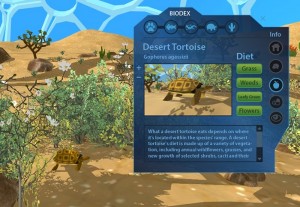 Cliqist: Do you feel that “teaching games” (for lack of a better term) have an unfortunate stigma around them? If you believe this is the case, do you feel Tyto Online can change that misconception?
Cliqist: Do you feel that “teaching games” (for lack of a better term) have an unfortunate stigma around them? If you believe this is the case, do you feel Tyto Online can change that misconception?
Lindsey: Yes, they really do. If I ask a kid if they play any educational games, they often tell me that they don’t play them because they suck. My marketing intern doing research for our Kickstarter on educational games came to me the next week and said she really thought we should avoid calling it that because of the stigma it has.
One of the primary reasons for this stigma is because of the bad educational games that just try to dress up rote practice of content with a game. This is when you see games that have you, for example, answer a math problem and then you get to shoot a zombie. The gameplay is completely separate from the learning, and is often referred to as “chocolate covered broccoli.” It’s just dressing up the same old rote practice, not using game mechanics to teach in a more active way.
There are some great learning games out there that do use interesting game mechanics in the learning process, though! But they still don’t necessarily feel like a world you can go get lost in, and they aren’t something you want to play for years. That’s where we really diverge. We are creating a complete game with a unique world with its own lore and using great learning game mechanics, in this MMORPG genre so that we can have it extend all and integrate together in a single game world. Obviously an MMORPG means fun, social things too, so our development plans include a PvP arena with water balloon capture the flag, an arcade, and a mall. We want this to be the type of game that students play for fun, socialize in, and go do quests in that just happen to be learning-based — and hopefully want to benefit from that learning, too!
So yes, I think when a game like that exists, when students just spend time in a learning game for fun, this misconception is going to change.
Another note: we also have the potential to be big enough, as one game with all of this content in it, that we can have an impact on the understanding of the genre as a whole. If we were pushing out small separate titles, I don’t think we’d be able to really change the feel of a genre like “educational games”; with an MMORPG though, we have the opportunity to help defragment this market and give a flagship learning game title that’s fun and changes perspectives on what it means to learn in a video game.
Cliqist: How have you and your team been spreading the word of this Kickstarter? Are you surprised with the ever-increasing funds that have been raised so far?
Lindsey: We had a launch party for the Kickstarter to help with some initial local attention, and live streamed it on Twitch.tv as well. That weekend we then attended a gaming event, Games Art and Music, to talk to more about our game.
Otherwise, we’ve been tweeting and reaching out to press – from indie gaming to educational technology and homeschoolers. It’s actually been somewhat difficult to reach a large audience outside of your own network, and we’ve reached that “mid-Kickstarter slump” and haven’t been increasing too much lately.
We are working on more now: reaching out to a wider variety of bloggers, and more, talking about putting flyers around our home town in every relevant place, doing a Reddit AMA, pushing out more updates. I keep telling my team and the same applies here — any ideas are welcome!
Cliqist: Down the road would you like to see Tyto Online integrated with classroom learning or is it envisioned as its own platform?
Lindsey: Definitely both.
We are matching the quests with state standards and envision teachers being able to log into the web backend and search by standard to assign the relevant quests to their students. When the student logs into the game for class time, they can port right to that area to not spend time on traveling (teachers often only have about 20 minutes for game based learning per session). We are working with our consulting teachers on creating lesson plans so that teachers who use the game can have set suggested introduction activities, what to assign in the game, and then how to help debrief and close off the learning. We’ll of course keep adding and adjusting based on feedback from teachers so that we end up with a really great set of tools and lesson plans to help with school implementation.
At the same time, students need to be able to dig deeper into subjects that are interesting to them. They also need to be able to explore subjects that are important but not necessarily part of state curriculum — financial literacy, entrepreneurship, etc. One of the things I get most excited about with Tyto Online is this idea that a student will be able to go explore and discover new subjects and dig into them and get exposed to amazing ideas and opportunities. It’s this power as a platform to engage students in novel learning and experiences that adds an entirely new level onto what we are building.
Cliqist: Speaking of which, has it been hard to explain what exactly this game is to non-gaming folks or do they seem to grasp the concept well enough?
Lindsey: This has been one of my largest challenges, actually. When I am talking to a new person, I first ask if they are a gamer. If they say yes in a way that seems like they have a pretty good exposure to games, I say, “We’re making an educational MMORPG.” They pause for a moment and then generally exclaim how amazing that is.
I was actually talking to someone who doesn’t game much recently who did not quite believe me when I said that gamers actually knew what an MMORPG is, and got the concept just from that. A few days later he introduced me to someone who was a gamer, and got it instantaneously off that two-word explanation, and he started laughing and had to admit I was right. (We did have further discussion and I explained our specific vision and why it’s great for learning, but the initial explanation is so quick with gamers.)
Now for non-gamers, it obviously takes a bit longer! If I just tell a non-gamer that we are harnessing the addictive power of video games for learning, they are still on board and excited about that. But it’s often because they don’t realize that educational games exist at all yet and just think that idea is great.
If I then try to explain what educational games are normally like, how we are different, what this type of game is, and what the experience is going to be like for a student (and why it’s an amazing learning tool), it’s just information overload.
I think the issue is that as gamers, when we hear someone introduce a new game, we have this mental schema of many different genres, and sub-genres, and what that means for gameplay. It’s easy for us to understand the differences. To a non-gamer, games just all go in one big mental box called, “games.” There is no further mental schema that they even vary or play differently, so to try to understand that all is difficult. (I think this is why we are constantly being asked how we compare to Minecraft, even though we’re such a different genre and approach.)
I’ve had to learn to accept non-gamers being excited about what I am doing without necessarily fully comprehending what is involved, or just introduce a couple concepts to help them understand it. (Leveling up and quests are the important two I often discuss.)
Cliqist: What is your ultimate dream version of Tyto Online? What subjects would it cover, what audiences would it reach, and how might it change how people view video games?
Lindsey: How long did you want this interview to be? 🙂
So before I go into my ultimate dream version of Tyto Online, please remember this is going to be iteratively released, adding frequent mini-expansions with additional content. I don’t see the building of Tyto Online to be ever done (like any good MMORPG), as there should always be more content being added for your players.
I am going to now daydream and explain my vision for very far into the future…
We cover 3rd through 12th grade, every subject linked to school. Students can explore the sciences, engage with literature in a new way, interact with history, improve their reading skills, apply governmental concepts. They’re doing this all by engaging in the story line — for example, researchers need help filling gaps in the historical records by the student going into the holographic data.
At the same time, we want a rich experience outside of school standards, where students can experience entrepreneurial concepts, apply personal finance, learn deeper in technology and engineering. Again, this is tied into the game world — for example, the student can learn about financing in a safe way by financing their own in-game car.
We want this learning to be linked to the external world. Ideally, we would be able to make partnerships with corporations, such as Best Buy giving a small gift certificate to students who have completed advanced computer modules (by leveling up that area, of course), or a bank would provide a special account type to the students who completed leveling up in personal finance.
We are also building up our suggested activities to link the in-game learning outside of the game. This is an update I need to make on the Kickstarter, as it was so long I couldn’t even fit some of this in! But basically, if the student learns about something, their parent or they themselves can access suggested real life activities linked to it. For example, if they learn about volcanoes in the game, their parents will get the instructions on how to build a volcano in the kitchen that night. I’d like to extend this even further, and after students have learned about social good issues, like pet adoption, provide them information on how to volunteer at a local humane society.
We are also making a fun social game, so we will be building our PvP arenas, like water balloon capture the flag, that will have some great competitive arena game mechanics while being nonviolent and accepted in schools. We have also discussed making in-game sports teams, having in-game live concerts for bands targeting our demographic, in-game art galleries that students submit to… we had to cut off ideas because there is just too much we could be writing down in our spreadsheet of things to do in the future!
Another element we don’t talk about frequently because we haven’t worked through the details (but you did ask about my dream version) is that we want to build a module creator so that teachers, developers, and even students, can publish their own modules through an in-game download option (functioning like an app store). This would be after we have built up quite a bit of our own content and learned from that, but at that point we can pull from a library of the game mechanics and assets we have developed for the module creator. In this way, we open up to anyone being able to build additional content. There is an unlimited amount of content that can be taught, and in different ways, so we are excited about being able to open up to so much more content after this point in our studio’s development.
So the long-term vision is obviously pretty audacious. Image a massive platform of learning opportunities, in-game and outside of it, around school curriculum and extracurricular learning opportunities. Students can play socially, engage in arts and humanities, or drill down deep into sciences, all in an integrated world with an epic story line and social interactions with friends in a supportive community.
If we are able to accomplish this vision, we won’t just be changing people’s perception of games from wastes of time into something that can benefit people’s lives, but we will be providing opportunities for learning and engagement on a new level. If our game becomes widely adopted and played, we can introduce the next generation using it to an incredible amount of learning, skills, and opportunities for their lives.
Cliqist: Finally, here’s the chance for you to pitch your project to folks who still haven’t grasped what it’s all about. What is Tyto Online and why is it a game that needs to be Kickstarted?
Lindsey: We are harnessing the additive power of video games for learning!
If you’re a gamer: We’re an educational MMORPG. We are building engaging gameplay set in a futuristic virtual world that will be linked to real learning content and skills.
If you’re not a gamer: We’re building a social online learning game where students level up a character in a 3D virtual world. They do this by completing quests, and in our case these quests are linked to educational content. Quests are a great learning tool as they are embedded in context (the story line of the game), and they involve active, constructive learning. Students will be solving problems with these quests that will lead them to learning the material!
This type of game is massive, so we’re starting with one module of middle school ecology and the base social features, but then will keep expanding with frequent mini-expansions as we build out our world.
We are on Kickstarter to help fund this first module that will then allow us to keep expanding. We believe Tyto Online needs to be made because it has such an incredibly large potential for impact. With the support from our backers, we can unleash the potential of this game as a platform for deep learning experiences.
If you’re a parent, you can likely imagine how great it would be if the time your kid spent with games was also helping them learn and acquire new skills. You also get to participate and have a link between what your child is learning about in the game back to the real world with activity suggestions and updates from our back-end dashboard.
If you’re not planning on having kids, you can be excited to be part of providing so many opportunities to students that might not otherwise have them. Many people tell us they wish they had a tool like this growing up – and I do, too. I only imagine how much I could have learned when I was younger, and the even larger immediate impact that could have led to me making with my life.
[divider]A huge thank you goes out to Lindsey for taking the time to answer our multitude of interview questions! You can check out Tyto Online’s Kickstarter right here. The campaign ends on August 10th so be sure to donate soon if you’re interested.
[divider][Google][pinterest][follow id=”Cliqist” size=”large” count=”true” ] [author image=”http://cliqist.com/wp-content/uploads/2014/01/marcus.jpg” ]Marcus is a fellow with a love for video games, horror, and Japanese food. When he’s not writing about games for a multitude of sites, he’s usually still playing one. One day when he became fed up with the way sites would ignore niche titles he decided to start his own site by the name of Pixel Pacas. Writing about video games is something he hopes to continue doing for many years to come. Some of Marcus’s favorite games include Silent Hill 2, Killer7, and The Sims. [/author]

